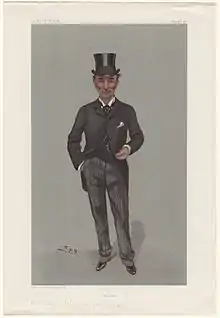
Charles Algernon Whitmore (24 September 1851[1] – 10 September 1908[2]) was a British barrister and Conservative Party politician. He sat in the House of Commons from 1886 to 1906, as the Member of Parliament (MP) for Chelsea.
Early life
Whitmore was the son of the county court judge Charles Shaplabd Whitmore QC and his wife Elizabeth Katherine, a sister of Sir Henry Brownrigg, Bt.[1] He was educated at Eton and Balliol, and became a Fellow of All Souls in 1874, before being called to the bar in 1876 at the Inner Temple.[1]
Political career
At the 1885 general election, Whitmore unsuccessfully contested the parliamentary borough of Chelsea in London, where he lost by 175 votes (2%) to the sitting MP, the Liberal Sir Charles Dilke, Bt.[3]
However, in early 1886 Dilke was involved in a high-profile divorce case which grew into a high-profile sex scandal, and at the next general election, in July 1886, Whitmore defeated Dilke with a majority of 176 votes.[3] He served for a time as private secretary to the Home Secretary Henry Matthews,[1] who as a barrister had conducted the cross-examination of Dilke, destroying the latter's career.[4]
Whitmore served as the Second Church Estates Commissioner, and in 1895 he was elected by London County Council as an Alderman for the Moderate Party, serving until 1901.[1] He was re-elected as MP for Chelsea at three further elections, but at the 1906 general election he was defeated by the Liberal candidate Emslie Horniman.[3]
References
- 1 2 3 4 5 Debrett's House of Commons, and the Judicial Bench. London: Dean & Son. 1901. p. 158. Retrieved 23 August 2012.
- ↑ Leigh Rayment's Historical List of MPs – Constituencies beginning with "C" (part 3)
- 1 2 3 Craig, F. W. S. (1983) [1989]. British parliamentary election results 1885–1918 (2nd ed.). Chichester: Parliamentary Research Services. p. 99. ISBN 0-900178-27-2.
- ↑ Jenkins, Roy (September 2012) [1958]. "Chapter 13: The Case For Dilke". Dilke: A Victorian Tragedy. London: Bloomsbury Reader. ISBN 978-1448200498.